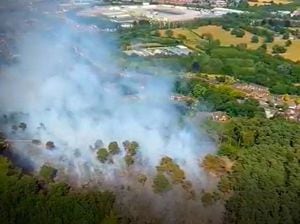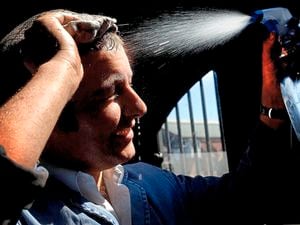West Midlands fire chiefs praise crews and staff for doing 'exceptional job' during last year's record heatwave as call-outs soared
Fire chiefs have praised crews and staff for doing an "exceptional job" during last year's record heatwave as call-outs soared.

Record temperatures sparked a wave of blazes across the country last summer.
West Midlands Fire Service was called to 4,011 fires in July, August and September 2022 – a 71 per cent rise on the same period in 2021, when there were 2,343 call-outs.
There were record temperatures in the West Midlands and fire crews were called out to a number of wildfires, including one on the Lickey Hills last July.
A spokesman for West Midlands Fire Service said: "Soaring temperatures and prolonged dry spells mean we get more 999 calls and often need to respond to multiple incidents simultaneously.
"However, our fire crews, fire control and support staff did an exceptional job last summer in keeping our communities safe.
"We were also very grateful to the overwhelming majority of people for heeding our fire-risk warnings and reporting incidents to us."
Fire chiefs said the service continually reviews how its resources and staff are distributed – on a minute-by-minute basis – when demand is high.
"We also make sure that we match our resources to the type of incidents to which we respond, rather than take a ‘one size fits all’ approach," the spokesman added.
"For example, we might send two firefighters in one of our 4x4 response vehicles to a smaller grass fire, ensuring that our fire engines stay available for more significant emergencies.
"This flexible approach to managing risks faced by our communities came into its own during last summer’s spate weather conditions."
Last summer England saw the joint warmest mean temperature ever recorded (17.1C) equalling that of summer 2018, while some areas saw less than 50 per cent of their typical summer rainfall.
The warmest and driest areas were in the East of England, while for East Anglia and parts of northeast England it was the hottest summer on record.
Matt Wrack, general secretary of the Fire Brigades Union, warned climate change means fire services need to do more to prepare for future extreme weather, and the impact it has on firefighters.
A Home Office spokesperson acknowledged the increase in fire numbers, but pointed out there had been no corresponding increase in fire-related fatalities compared to the previous year.
They said: “The Government is committed to ensuring fire services have the resources they need to keep us safe, including from wildfires, and, overall, fire and rescue authorities received around £2.5 billion in 2022-23.
“The Home Office maintains regular engagement with national bodies including the National Fire Chiefs Council and England and Wales Wildfire Forum to monitor and review sector led improvements to wildfire response and mitigation.”





